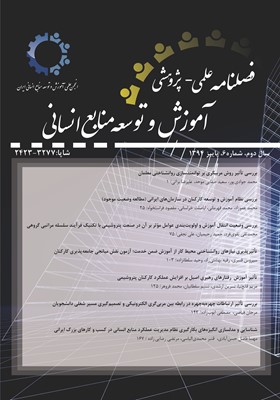بررسی تأثیر ارتباطات چهره¬به¬چهره در رابطه بین مربی¬گری الکترونیکی و تصمیمگیری مسیر شغلی دانشجویان
محورهای موضوعی :مرجان فیاضی 1 * , مصطفی ایوب زاده 2
1 - تهران
2 -
کلید واژه: مربیگری مربیگری الکترونیک تصمیمگیری مسیر شغلی خودکارآمدی تصمیمگیری مسیر شغلی ارتباطات چهره به چهره,
چکیده مقاله :
از دیرباز فرایند مربی گری دارای اهمیت بسیاری بوده و امروزه نیز با استفاده از فناوری های اطلاعاتی در این زمینه، بر اهمیت این موضوع افزوده شده است. این پژوهش از نوع مطالعات شبه تجربی بوده و هدف از انجام آن، بررسی تأثیر یک برنامه مربی گری الکترونیکی بر تصمیمگیری مسیر شغلی دانشجویان مقطع کارشناسی رشته مدیریت و هم چنین بررسی اثر ارتباطات چهره به چهره در بهبود نتایج این روابط است. به منظور اجرای این پژوهش، یک رابطه مربی گری بین 12 مربی و 86 شاگرد، انجام گرفت؛ که بهمنظور بررسی اهمیت دیدار چهره به چهره بین مربی و شاگرد در این پژوهش، نیمی از شاگردها امکان ملاقات مربی خود را داشتند. یافتههای این پژوهش نشان دهنده آن است که تصمیمگیری مسیر شغلی دانشجویان، در هر یک از پنج بعد خودارزیابی، کسب اطلاعات شغلی، هدفگذاری، برنامهریزی برای آینده، و حل مسأله، پس از برگزاری دوره مربیگری الکترونیک نسبت به پیش از برگزاری آن ارتقا یافته است. سایر نتایج این پژوهش، نشان دهنده آن است که ارتباطات چهره به چهره سبب ایجاد رضایت بالاتری از رابطه مربی گری و ارتقای بیشتر تصمیمگیری در مورد مسیر شغلی می شود.
Traditionally, mentoring process was very important and it seems to be more important than before with the use of information technology. This study was a quasi-experimental study and its aim is to investigate the effect of an electronic mentoring program on students’ career path decisions among graduates of management and also the effect of face to face communication to improve the outcomes of these relationships. In order to implement the study, a mentoring relationship was carried out between 12 mentors and 86 mentees and in order to examine the importance of face to face meeting among mentors and mentees, half of the mentees had the opportunity to meet their mentors. The results indicate that students’ career decisions in each of the five dimension of self-assessing, getting occupational information, goal setting, planning for the future, and problem solving has been promoted after mentoring courses compared to before holding course. Other results of the study indicate that the face to face meeting create higher satisfaction of mentoring relationship and promote the career path decisions.

